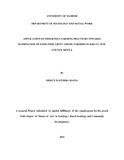| dc.description.abstract | The purpose of this study was to investigate the role of indigenous farming practices in
promoting food security among farmers in Kikuyu Sub-County, Kenya. It was guided by the
following research objectives: to determine the influence to which indigenous and western
farming practices has on food security and the available measures put in place by the government
to ensure continuity in utilization of indigenous knowledge. This study was based on
Observational learning theory and Social exchange theory. The study adopted a descriptive
survey design. Questionnaire tools were adopted to collect the data from farmers and an
interview guide to interview the key informants. The study sample population comprised of 90
farmers and ten key informants. Eight key informants were interviewed and 86 questionnaires
were returned, realizing an instrument return rate of 94%.
The research findings revealed that Kikuyu Sub-County’s level of food security is low due to the
small pieces of land for farming in the County and unreliable weather conditions hindering
effective food production. On farmers understanding of indigenous farming practices 55.9% of
the respondents indicated that indigenous farming practices entails farming without chemicals.
However, majority of the respondents indicated that they do not apply indigenous farming
practices in their farms due to the long duration taken before the matured indigenous foods are
harvested. While on farmers understanding of conventional farming practices 45.3% of the
respondents indicated that they understood conventional or western knowledge farming practices
as farming using fertilizers to their crops to boost growth. However, application of
conventional/western farming practices can lower household levels of food security when the
practices degrade the environment and soil quality thus lowering harvest with time as well as
increased health complications. The Household Food Insecurity Access Scale (HFIAS)
measurement tool revealed that food in the households was insecure due to it being unavailable
and inaccessible. This revealed that 8.5% of the households were faced by moderate food
insecurity, severe food insecurity 4.7% and 56.5% were food secure.
Based on the study findings the study concluded that Indigenous knowledge represents valuable
source of local solutions to food insecurity in terms of accessibility by the rural population,
particularly during seasonal food shortage or major stress periods such as droughts. Thus, the
researcher made the following recommendations; the government through the ministry of
Agriculture should document records on indigenous knowledge practices to ensure that the
knowledge is easily passed on between generations. Most farmers proposed that the government
should come up with ways to avail indigenous crops, offer farmers with financial aid to buy farm
input, start-up rural watering projects and organize awareness forums as some of the measures
that could empower farmers to ensure effective utilization of indigenous farming practices. | en_US |

